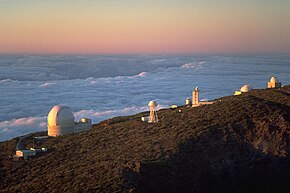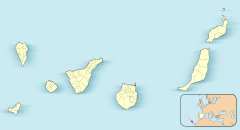Roque de los Muchachos Observatory
Roque de los Muchachos Observatory (Spanish: Observatorio del Roque de los Muchachos, ORM) is an astronomical observatory located in the municipality of Garafía on the island of La Palma in the Canary Islands, Spain. The observatory site is operated by the Instituto de Astrofísica de Canarias, based on nearby Tenerife. ORM is part of the European Northern Observatory.
 Overview of some of the telescopes at the Roque de los Muchachos Observatory. | |
| Alternative names | ORM |
|---|---|
| Organization | |
| Observatory code | 950 |
| Location | Garafía, Province of Santa Cruz de Tenerife, Canary Islands, Spain |
| Coordinates | 28°45′49″N 17°53′41″W / 28.7636°N 17.8947°W |
| Altitude | 2,396 m (7,861 ft) |
| Established | 29 June 1985 |
| Website | www |
| Telescopes |
|
| | |
The seeing statistics at ORM make it the second-best location for optical and infrared astronomy in the Northern Hemisphere, after Mauna Kea Observatory, Hawaii. The site also has some of the most extensive astronomical facilities in the Northern Hemisphere; its fleet of telescopes includes the 10.4 m Gran Telescopio Canarias, the world's largest single-aperture optical telescope as of July 2009,[1] the William Herschel Telescope (second largest in Europe), and the adaptive optics corrected Swedish 1-m Solar Telescope.
The observatory was established in 1985, after 15 years of international work and cooperation by several countries, with the Spanish island hosting many telescopes from Britain, The Netherlands, Spain, and other countries. The island provided better seeing conditions for the telescopes that had been moved to Herstmonceux by the Royal Greenwich Observatory, including the 98 inch aperture Isaac Newton Telescope (the largest reflector in Europe at that time). When it was moved to the island it was upgraded to a 100-inch (2.54 meter), and many even larger telescopes from various nations would be hosted there.
History
editThe building of the observatory goes back to 1969, with the start of the Northern Hemisphere Observatory project.[2] After ten years of research on the site there was a big international agreement between several nations to establish an international Observatory at La Palma.[3]
The observatory began operation around 1984 with the Isaac Newton Telescope, which was moved to La Palma from the Royal Greenwich Observatory site at Herstmonceux Castle in East Sussex, England. The move was troubled, and it is widely recognized that it would have been cheaper to build a new telescope on-site rather than to move an existing one.
The observatory was first staffed by representatives from Spain, Sweden, Denmark and the United Kingdom. Other countries which became involved later include Germany, Italy, Norway, the Netherlands, Finland, Iceland, and the United States.
The observatory was officially inaugurated on 29 June 1985 by the Spanish royal family and six European heads of state. Four helicopter pads were built at the observatory to allow the dignitaries to arrive in comfort. The observatory has expanded considerably over time, with the 4.2m William Herschel Telescope opened in 1987, the Nordic Optical Telescope in 1988 and several smaller solar or specialized telescopes; the Galileo National Telescope opened in 1998 and the Gran Telescopio Canarias opened in 2006, with its full aperture in 2009.[citation needed]
A fire on the mountainside in 1997 damaged one of the gamma-ray telescopes, but subsequent fires in September 2005 and August 2009[4] did no serious damage to either the buildings or the telescopes.
In 2016, the Instituto de Astrofísica de Canarias and Cherenkov Telescope Array Observatory signed an agreement to host Cherenkov Telescope Array’s northern hemisphere array at the ORM.
In 2016, the observatory was announced as the second-choice location for the Thirty Meter Telescope, in the event that the Mauna Kea site is not feasible.[5]
Telescopes/observatories
editThe Spanish island is host to the premiere collection of telescopes and observatories from around the World, for the northern hemisphere excluding the Hawaiian islands which has a different mix of telescopes. The 10.4 meter Grand Telescope Canarias is the largest single aperture for an astronomical observatory in the world.
- Carlsberg Meridian Telescope (1984–2013)
- Dutch Open Telescope
- First G-APD Cherenkov Telescope (FACT) (2011– )[6]
- Galileo National Telescope
- Gran Telescopio Canarias (2007– )
- Gravitational-wave Optical Transient Observer (GOTO-N)[7]
- HEGRA
- Isaac Newton Telescope
- Jacobus Kapteyn Telescope
- Liverpool Telescope (2003– )[8]
- MAGIC
- MASCARA
- Mercator Telescope
- Nordic Optical Telescope
- Swedish Solar Telescope
- Wide Angle Search for Planets (WASP)
- William Herschel Telescope
- European Solar Telescope (In project)
Gallery
edit-
Several of the helicopter pads built for the inauguration ceremony can be seen under the now dismantled HEGRA array
-
Picture of the 10m Gran Telescopio Canarias building under construction in March 2003
-
Picture of the Nordic Optical Telescope (NOT)
-
Large-Sized-Telescope 1 of the Cherenkov Telescope Array (MAGIC)
-
360 degrees panorama as taken on 2011 January 28
See also
edit- Astronomical seeing
- Cherenkov Telescope Array
- Gran Telescopio Canarias
- IACT
- Instituto de Astrofísica de Canarias
- Isaac Newton Group
- La Palma
- List of space telescopes (Another important source of astronomical observations in this period)
- Roque de los Muchachos
- Teide Observatory
References
edit- ^ Klotz, Irene (24 July 2009). "New telescope is world's largest ... for now". Discovery. Archived from the original on 9 April 2013. Retrieved 27 May 2019 – via NBC News.
- ^ "Chronology of the Isaac Newton Group of Telescopes".
- ^ "Chronology of the Isaac Newton Group of Telescopes".
- ^ "Fires rage across Canary island". BBC News. 3 August 2009. Archived from the original on 2 August 2009. Retrieved 12 July 2013.
- ^ "Statement Regarding Selection of Alternate Site for TMT". Thirty Meter Telescope. 31 October 2016. Archived from the original on 1 November 2016. Retrieved 1 November 2016.
- ^ Weitzel, Q.; Anderhub, H.; Backes, M.; Biland, A.; Boller, A.; Braun, I.; Bretz, T.; Commichau, V.; Djambazov, L.; Dorner, D.; Farnier, C. (October 2011). "FACT: A novel camera for Cherenkov telescopes for ground-based gamma-ray astronomy". 2011 IEEE Nuclear Science Symposium Conference Record. pp. 1857–1860. doi:10.1109/NSSMIC.2011.6154373. ISBN 978-1-4673-0120-6. S2CID 13435504.
- ^ "The Gravitational-wave Optical Transient Observer (GOTO)". Instituto de Astrofísica de Canarias • IAC. Retrieved 2024-01-31.
- ^ Leverington, David (2017). Observatories and Telescopes of Modern Times. Cambridge University Press. ISBN 9780521899932.
